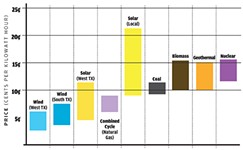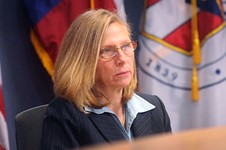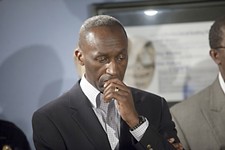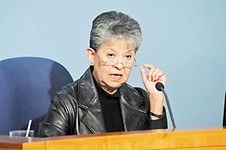It's Not Easy Being Green
The city's Office of Sustainability is still trying to find a sustainable mission
By Mike Kanin, Fri., April 5, 2013
(Page 2 of 3)
Spreading the Word?
Whether or not the office can show adequate metrics, it's clear that Athens and her team have struggled in getting the word out to the wider environmental community – the folks that should be her strongest allies – about what it is that she and her department are up to. On a recent Thursday, Sierra Club Vice Chair Roy Waley and environmental engineer Lauren Ross were waiting their turn to address Council members on the lingering issue of the city's project duration ordinance.
"If I knew someone that knew something about that office, I'd send 'em your way," Waley told me. He turned to Ross. "What do you know about the Office of Sustainability?"
"The Office of Sustainability – well, they were here earlier today. Lucia Athens is the head," Ross said.
"Yeah, but what were they doing?" asked Waley.
"I don't know," replied Ross.
"No one does," Waley fired back. "That's [the] problem. ... What do they actually do? They've been moved from one place to another to another, and what have they actually done?"
"Nothing that I know of," said Ross.
"I helped them hang up some signs for a Great Streets event one time. So I know they hang signs up," concludes Waley. "But I don't know if they take 'em down and reuse them."
Wherever the fault lies, this lack of successful outreach is a clear problem for Athens and the Office of Sustainability. Paula McDermott is the chair of the regional Sustainable Food Policy Board. By name alone, one would presume that McDermott and her city-side colleagues would fall under – or at least within the purview of – Athens' office. In fact, they reside in a division of the Parks Department, under the supervision of the same guy who watches over the park rangers. This bureaucratic oddity is a remnant, because what amounts to the city's sustainable food policy program grew out of – and remains severely limited by – its beginnings as a community gardens program. It has never truly migrated to Sustainability.
McDermott acknowledges that she is not the best source on Athens or her work – simply because they haven't worked all that closely. And she notes that Athens has been supportive of the board. Still, she offers some thoughts about Athens and her office – in so far as she can. "We're still trying to understand their role," she says.
Similarly, Paul Robbins, the city's self-designated-and-overloaded citizen advocate for all things utility, should also know something about the city's Office of Sustainability. Robbins used to work for the city department – alongside Athens – that was something of a precursor to the Office of Sustainability. And Austin Energy – with Austin Water one of Robbins' two major preoccupations – is responsible both for what is certainly one of the larger obstacles to environmental sustainability – the Fayette coal plant – and the pending solution to that problem: the Climate Protection Program.
Robbins says he "honestly [doesn't] know what they are doing."
Athens herself notes that community engagement is indispensable for her program. "[A]nother challenge we face is mobilizing everyone in our community to become a part of the solution and to take action," she says. "We can't just expect government to solve all our problems for us. Granted, government has a key role to play. But we have to work together. It is going to take the creativity and ingenuity of people from all walks of life, to forge solutions to the challenges ahead and ensure the continuation of the current wonderful quality of life we enjoy here in Austin, the beloved city we call Home."
The Limits of Neutrality
The lack of public awareness contributes as well to a widespread misunderstanding of the three-pronged, triple bottom line repeatedly emphasized as sustainability's central principles. There is no better example of this dynamic than the ongoing struggle to incorporate alternative fuels into the city's vehicle fleet. It's a complex problem. The city, of course, uses a wide variety of vehicles to fill the service needs of its personnel; not all of those needs can be met with hybrids or ethanol-fueled automobiles. The Austin Police Department, for example, presents a particular and large challenge, and APD managers insist that alternative fuels cannot fulfill the mission requirements of patrol cars.
Still, in 2007, Council members approved a directive, as part of the ACPP, instructing then-City Manager Toby Futrell to achieve fleet "carbon neutrality" by 2020. By May 2010, the Office of the City Auditor had already issued a critical audit that included two recommendations: "centralize alternative fuel policy and enforcement, and produce a comprehensive plan to bring the city's fleet to carbon neutrality by 2020."
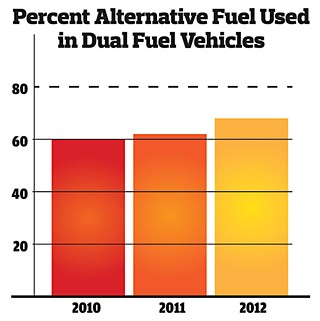
In January, Athens was in front of the Council's Audit and Finance Subcommittee to answer questions about that project. She had inherited the program, its goals, and its issues – including questions about whether ethanol is really an environmentally suitable alternative fuel. She was now at least partially responsible for the program's success (or failure), even if she does not have the authority to direct the head of the city's fleet department, Gerry Calk, on the matter.
Charged as she is with shepherding citywide sustainability progress, Athens had to answer for what was now clearly – given the ambitions of 2007 – a policy shortfall. A 2012 audit found that, though use of alternative fuels by city vehicles was growing, it was still far below the 80% line for dual-fuel vehicles mandated by what became the 2020 Carbon Neutral Fleet Plan (penned under Athens' authority).
Athens found herself in a curious position: defending a more conservative approach to sustainability. "We are very excited about the policy direction that Council has set for us to achieve a carbon neutral fleet by 2020," she said. "It's an ambitious goal, but really admirable. We are up to meeting it, and working diligently on meeting it, but it's not something that is common practice. ... We don't have models to follow. It is a constantly moving target with advances in technology and changing costs.
"I think we're doing a good job of working towards that, but it is a process that we're going to have to adjust as we go," she continued. "We're learning as we go."
Later, she reminded the Chronicle that green-as-possible doesn't always coincide with the overall mission of sustainability. "Sustainability itself is defined as finding an appropriate balance among environmental issues, cost and economic issues, and social equity and community issues."
In an email following a lengthy interview at her City Hall office, Athens returned to the subject of the Carbon Neutral Fleet Plan. "As I expressed recently to the Audit and Finance [Subcommittee], this is a very ambitious goal. Indeed, according to a study done by the Carbon Disclosure Project, Austin's government operations emissions reduction target is among the most ambitious in the world, with the City of Melbourne being the other city with the same aggressive goal," she wrote. "This is a very exciting goal to be working towards, and it is this kind of visionary thinking that makes Austin a green leader, as well [as] a place that attracted me to take on the position of Chief Sustainability Officer. I love this stuff, it's what gets me up in the morning! However, no one yet, as far as I know, has achieved this goal. There are few models to follow, and we are working hard to find practical ways to meet the goal without 'breaking the bank.' The lessons we learn as we strive to get there will provide models for other cities following our lead. It is worthy work to be doing, and I am thrilled to be helping to lead the charge for Austin. However, let's not kid ourselves by telling ourselves this is going to be easy."
Got something to say on the subject? Send a letter to the editor.





